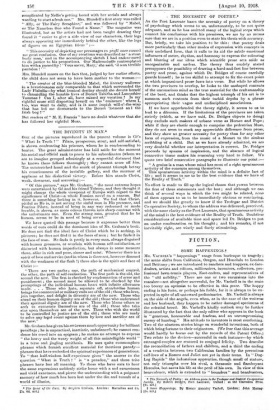_ THE NECESSITY OF POETRY.* As the Poet Laureate bases
the necessity of poetry on a theory of psychology which seems to us, unfortunately, to be not quite adequate, and as he has omitted many of the logical steps which connect his conclusions with his premisses, we are by no means sure that we are in a position even to state his thesis with accuracy. But, briefly, we take his position to be this : that poetry deals more particularly than other modes of expression with concepts in their undefined form, that it calls to its aid the subtle emotional influences of metre, rhythm, and harmony to express the colouring and blurring of our ideas which scientific prose sets aside as unorganizable and useless. The theory thus crudely stated presupposes the possibility of drawing a hard-and-fast line between poetry and prose, against which Dr. Bridges of course carefully guards himself ; he is too skilful to attempt to fix the exact point at which impassioned prose fuses into verse. But while he allows the two provinces to overlap, he looks to the unshaped contents of the unconscious mind as the true material for the craftsmanship of the bard, and thinks that the highest triumph of his art is to summon such contents from their turbid depths by a phrase appropriating their vague and undisciplined associations.
If we have apprehended the theory rightly, it seems to us to lead to a dilemma. If the limitations of the provinces are taken strictly (which, as we have said, Dr. Bridges objects to doing) they exclude such makers of urbane verse as Horace and Pope ; while if they are elastic enough to comprise the pedestrian Muse, they do not seem to mark any appreciable difference from prose, and they show no greater necessity for poetry than for any other form of expression, from the music of a Mozart to the aimless scribbling of a child. But as we have already admitted, we are very doubtful whether our interpretation is correct. Dr. Bridges proceeds by spasms of inspiration, and the absence of logical connective tissue makes his reasoning very hard to follow. We quote two brief consecutive paragraphs to illustrate our point :— "A genius is a man whose mind has most of a right spontaneous activity of the concepts among themselves.
This spontaneous activity within the mind is a definite fact of life; • and it seems to me to be the best evidence that we have of the Reality of Truth."
No effort is made to fill up the logical chasm that yawns between the first of these statements and the last ; and although we can think of several ways in which the two might be related, none of them appears to us to be immediately obvious or convincing, and we should like greatly to know if the Tredegar and District Co-operative Society, to whom the address was delivered, perceived, with the same clarity as the Poet Laureate, that spontaneous activity of the mind is the best evidence of the Reality Of Truth. Doubtless considerations of available time and space led Dr. Bridges to put an undue condensation on hia thought ; and his remarks, if not inevitably right, are wisely and finely stimulating.


































 Previous page
Previous page